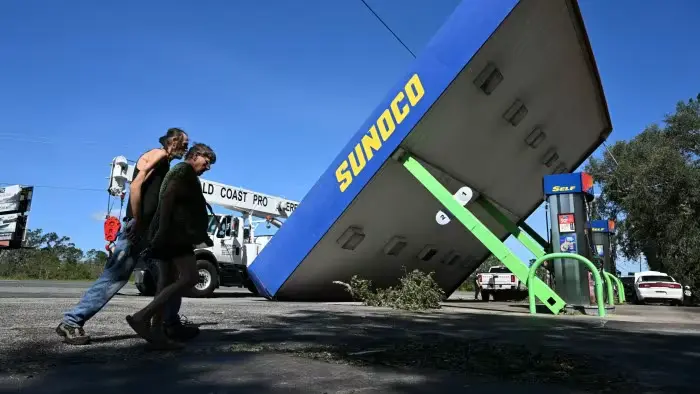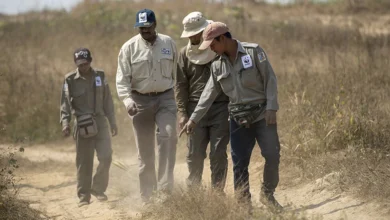Augusta GA Helene Damage: Assessing the Impact and Path to Recovery

Augusta GA Helene Damage, Natural disasters leave a profound impact on communities, reshaping lives, landscapes, and economies. Augusta, GA, known for its vibrant culture and rich history, recently faced significant challenges due to the aftermath of Helene, a storm that caused widespread damage.
This article provides a comprehensive look at the Augusta GA Helene damage, from its immediate effects to ongoing recovery efforts and future prevention strategies.
Introduction to Augusta GA Helene Damage
Augusta, Georgia, is a city steeped in history and tradition, known worldwide for the Masters Golf Tournament and its picturesque riverfront. However, the recent devastation caused by Helene has overshadowed the city’s usual charm.
The storm’s arrival left behind physical destruction, environmental changes, and economic burdens. Understanding the extent of Helene’s damage is crucial to building a more resilient Augusta.
Background Information
What is Helene?
Helene refers to a powerful weather system that recently swept through parts of the southeastern United States, including Augusta. Classified initially as a tropical storm, Helene intensified rapidly, bringing heavy rainfall, strong winds, and flooding to the region.
Overview of Augusta, GA
Situated along the Savannah River, Augusta is the second-largest city in Georgia. With a population of over 200,000, it serves as a cultural and economic hub for the region. The city’s geography, characterized by its proximity to waterways, made it particularly vulnerable to Helene’s impacts.
Types of Damage Caused by Helene
The storm’s wrath was multifaceted, affecting every aspect of life in Augusta.
Physical Damage to Property
- Residential Areas: Entire neighborhoods suffered from fallen trees, roof collapses, and waterlogged basements. Some homes were rendered uninhabitable.
- Infrastructure: Roads and bridges sustained structural damage, disrupting transportation across the city. Power outages left thousands of residents without electricity for days.
- Businesses: Local shops, offices, and industrial facilities faced heavy losses due to flooding and wind damage.
Environmental Impacts
- Flooding: Excessive rainfall led to swollen rivers and flooded streets, displacing residents and damaging ecosystems.
- Debris and Pollution: Uprooted trees, scattered debris, and runoff from the storm contributed to significant environmental degradation.
Economic Implications
The economic toll of Helene has been staggering, with estimates reaching millions of dollars in damage. Small businesses, in particular, have struggled to reopen, while residents face costly repairs and rising insurance premiums.
Affected Areas in Augusta
The damage was not evenly distributed, with some areas bearing the brunt of the storm’s force.
Specific Neighborhoods in Augusta
- Downtown Augusta: Historic buildings and commercial establishments suffered significant water damage.
- South Augusta: This region faced prolonged flooding, leaving many residents stranded.
- West Augusta: Residential areas experienced widespread power outages and tree damage.
Key Landmarks and Businesses Impacted
- Augusta National Golf Club: Although not open to the public at the time, parts of the course experienced minor flooding and tree damage.
- The Riverwalk: A popular attraction, the Riverwalk saw severe flooding, impacting local tourism.
- Hospitals and Schools: Several facilities faced closures due to power outages and structural concerns.
Response and Recovery Efforts
The aftermath of Helene showcased the resilience and unity of the Augusta community.
Local Government Actions
- Emergency Response: Augusta’s local government activated emergency plans, deploying first responders to assist residents and assess damage.
- Repair Projects: Public works teams focused on clearing debris, restoring power, and repairing critical infrastructure like roads and bridges.
- Financial Support: The city applied for state and federal disaster assistance, ensuring funds for rebuilding efforts.
Community Initiatives
- Volunteer Networks: Local groups organized food drives, shelter services, and cleanup crews to assist affected families.
- Faith-Based Organizations: Churches and nonprofits offered emotional support and financial aid to those in need.
- Fundraisers: Businesses and residents came together to raise funds for recovery projects, showing the strength of community bonds.
Assistance for Families and Businesses
- FEMA Support: Eligible families received aid for temporary housing, home repairs, and other essential needs.
- Small Business Loans: The Small Business Administration (SBA) provided low-interest loans to help business owners recover.
- Insurance Claims: Local insurance agencies worked overtime to process claims quickly and fairly.
Future Implications of Helene
While the storm has passed, its effects will be felt for years to come.
Long-Term Effects on the Community
- Economic Recovery: Small businesses and homeowners face years of rebuilding and financial recovery.
- Environmental Rehabilitation: Efforts are underway to restore damaged ecosystems and prevent long-term environmental degradation.
- Mental Health Impact: Coping with the trauma of the storm has highlighted the need for accessible mental health services in the community.
Steps for Prevention in the Future
- Improved Infrastructure: Strengthening levees, upgrading drainage systems, and modernizing public buildings can reduce the impact of future storms.
- Early Warning Systems: Investing in advanced meteorological technology ensures more accurate forecasts and timely alerts.
- Community Preparedness Programs: Educating residents about disaster preparedness can save lives and reduce damage.
Conclusion: Augusta GA Helene Damage
The Augusta GA Helene damage serves as a stark reminder of the power of nature and the resilience of communities. The physical, environmental, and economic toll has been immense, but Augusta’s response showcases the strength and unity of its people.
Moving forward, it’s essential to invest in preventative measures and provide ongoing support to affected families and businesses. Together, Augusta can rebuild stronger and better prepared for future challenges.
FAQs about Augusta GA Helene Damage
- What caused the Augusta, GA Helene damage?
Helene was a powerful storm that brought heavy rainfall, strong winds, and flooding to Augusta, resulting in widespread destruction. - Which areas in Augusta were most affected?
Downtown Augusta, South Augusta, and West Augusta faced significant damage, including flooding, power outages, and property destruction. - How is the community recovering from the storm?
Recovery efforts include government-led repair projects, community-driven initiatives, and financial assistance for residents and businesses. - What types of damage were caused by Helene?
The storm caused physical damage to properties, environmental degradation, and economic losses for businesses and residents. - How can future damage from storms like Helene be prevented?
Preventative measures include improved infrastructure, early warning systems, and community preparedness programs. - What resources are available for families affected by Helene?
Families can access assistance through FEMA, local nonprofits, and small business loan programs to help with recovery.
Join the effort to rebuild Augusta and support initiatives that protect our community from future storms. Together, we can weather any storm.



